Anthony Hill’s Newsletter
Christmas 2016
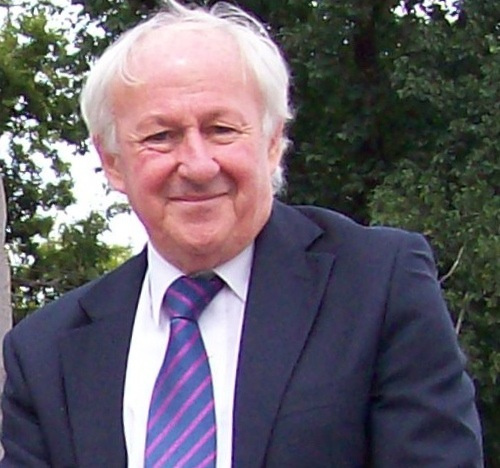
Dear friends
Welcome to the Christmas edition of my newsletter.
* Animal Heroes new edition almost ready for press
* The Story of Billy Young reprinted
* 4th Squadron Centenary remembers Young Digger
* Literary Landmarks: Dr Johnson's house
* Literary Awards
* Holiday story: Christmas at Bickendorf from Young Digger
Season’s Greetings and a Busy Old Year
Don’t know about you, but I’ve never known a year go by as quickly as 2016. It was supposed to be something of a ‘rest year’ for me. Instead, I’ve prepared three books for the press, undertaken a private commission, and it seems only last week I was writing out the 2015 Christmas cards.
Still, it’s been a productive year and a good one.
Most importantly for me was the successful publication of For Love of Country in March, now in its second printing, and the new edition of Young Digger which went on sale in June. Both are doing well – and there are some exciting developments around the latter which I might be able to tell you about in a future edition of the Newsletter.
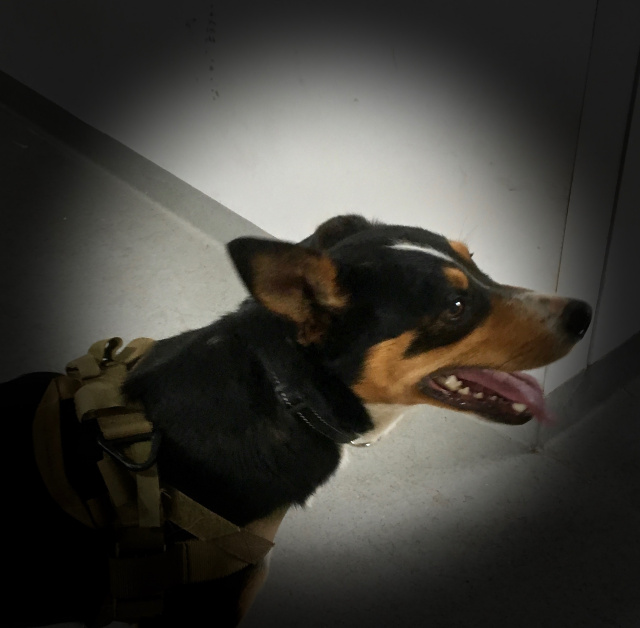 The second half of the year has been fully engaged with preparing the new edition of Animal Heroes for publication in March next year. Here’s a photo of a young trainee Explosive Detection Dog called Ace, one of the stars of the new edition.
The second half of the year has been fully engaged with preparing the new edition of Animal Heroes for publication in March next year. Here’s a photo of a young trainee Explosive Detection Dog called Ace, one of the stars of the new edition.
Deadlines have been tight – but the revisions and new material were delivered on time by end September, and the edited copy has been completed. Indeed, for an early Christmas present I’ve even been able to send the corrected first page proofs back to the Penguin editor a few weeks ahead of schedule.
I’m now planning to have my ‘rest year’ in 2017.
I anticipate the new edition of Animal Heroes will be my last military book, as I’ve little more to say on the subject.
Once Animal Heroes is complete I plan to take a few months’ sabbatical before starting work in the second half of the year on a convict story I’ve long wanted to write but put off for the past decade to work on The Story of Billy Young and For Love of Country. 2017 will be the convict’s turn. I’ll keep you posted.
Meantime let me thank everyone for your support over the last year, and extend every good wish to you and yours for the Festive Season.
The Story of Billy Young reprint
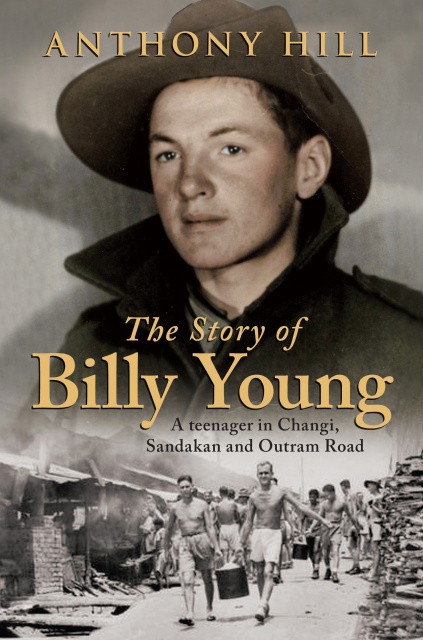
The Story of Billy Young has recently been reprinted – a relatively small run, however, in keeping with prevailing market conditions.
To keep costs down the photographs have been printed on ordinary paper stock rather than gloss. Unfortunately it’s meant that the colour has gone and the pictures are now all in black and white.
It’s a pity: but we all thought it better than to sacrifice the photographs altogether. And it has meant that the book remains in print.
For those of you with books containing the original colour photographs, they might just be worth hanging onto! And they’re still on my website.
4 Squadron Centenary
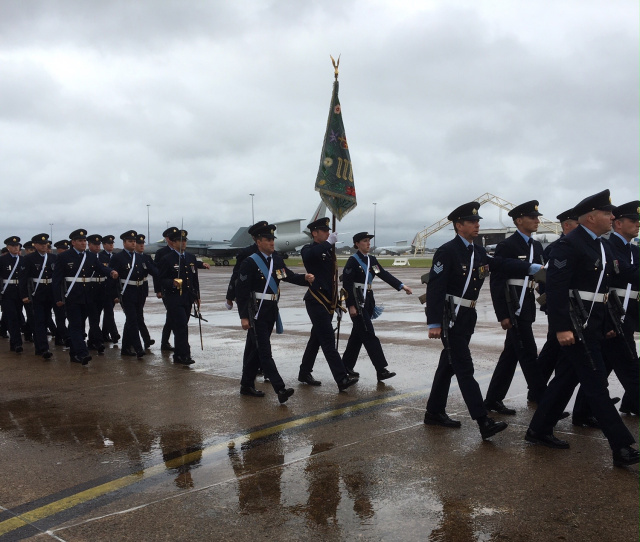 It was a great day at Williamtown RAAF Base, near Newcastle, at the end of October when 4 Squadron – together with 1, 2, and 3 Squadrons – celebrated their centenary.
It was a great day at Williamtown RAAF Base, near Newcastle, at the end of October when 4 Squadron – together with 1, 2, and 3 Squadrons – celebrated their centenary.
It was 4 Squadron, you’ll remember, that adopted the war orphan known as Young Digger as their mascot at the end of the First World War
They were the first four operational units of the infant Australian Flying Corps: and although it rained on their ceremonial parade during the early part of the morning, nothing could dampen the spirits of those families gathered there.
We were invited to attend, as I was to speak at 4 Squadron’s centenary dinner about the boy who called himself Henri Hemene Tovell after his foster father Leading Aircraftman Tim Tovell, and who is still remembered with much honour by the squadron.
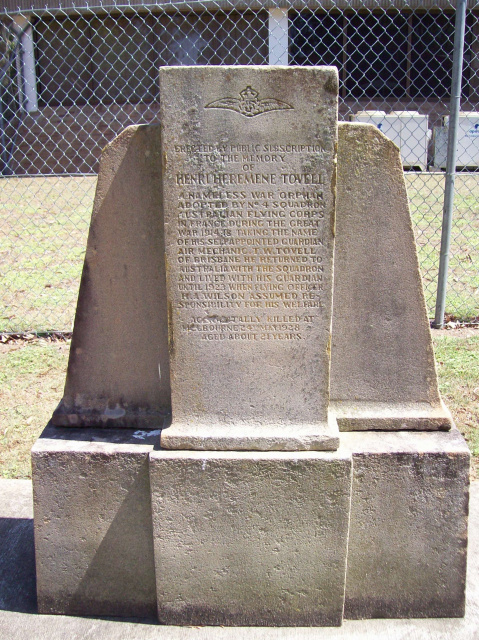
The Tim Tovell Shield is given annually to the squadron member who best exemplifies those qualities of compassion and loyalty.
Photographs of Digger hang on the HQ walls, and the lad’s original gravestone stands just outside the entrance door. It will be given an even better site when the squadron moves to new quarters at Williamtown next year.
As I remarked at the centenary dinner, Young Digger is one of the most remarkable and inspiring stories to come out of the Great War.
The squadron’s recognition of Tovell and the war orphan helps ensure that this generous tradition continues to guide the unit into the present and for the next 100 years.
Literary landmarks
Dr Johnson’s house
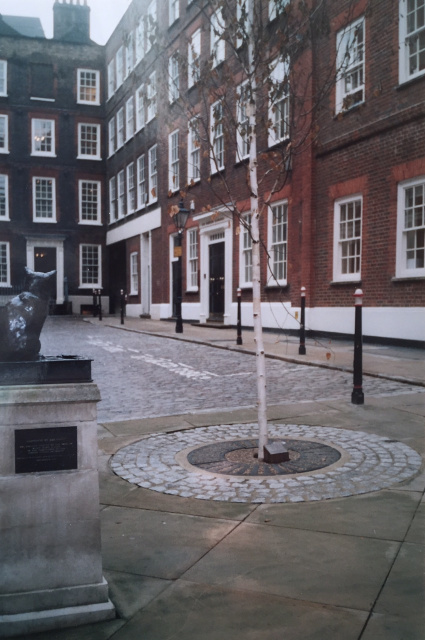 Visitors to London exploring the maze of lanes and alleyways behind Fleet Street may find themselves in a small L-shaped court, facing a late seventeenth century brick residence, known as 17 Gough Square.
Visitors to London exploring the maze of lanes and alleyways behind Fleet Street may find themselves in a small L-shaped court, facing a late seventeenth century brick residence, known as 17 Gough Square.
It stands five-storeys high from basement to attic, and a National Trust plaque on the wall informs the passer-by that this is one of the most celebrated houses still standing in the history of English literature. It’s at the end facing us in the photo.
For it was here that Dr Samuel Johnson compiled his great Dictionary of the English Language over nine years from 1746 – apparently he originally claimed he could do it in three – working almost single-handedly in the garret.
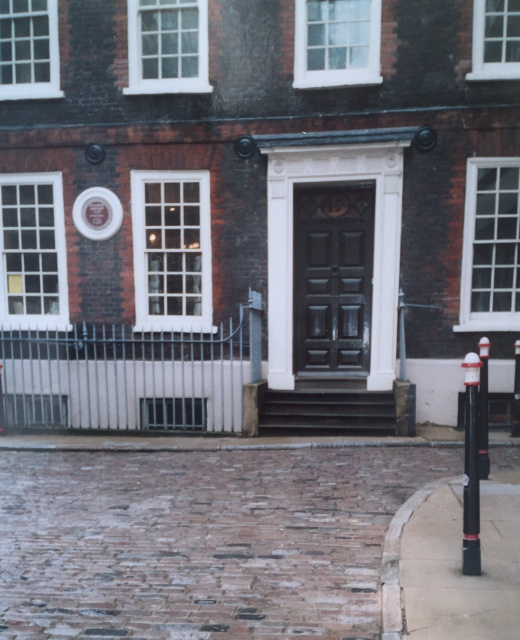 His only help was from assistants who copied out the many quotations with which he illustrated his definitions: a key innovation which ensured it remained the standard work until the Oxford English Dictionary was published nearly 175 years later.
His only help was from assistants who copied out the many quotations with which he illustrated his definitions: a key innovation which ensured it remained the standard work until the Oxford English Dictionary was published nearly 175 years later.
The dilapidated building was restored by the newspaper baron, Alfred Harmsworth, on the eve of the First World War.
Today, it’s managed by a Trust, and visitors can tour the elegant Georgian rooms and spend time in the attic where the good Doctor laboured over his work with much erudition, scholarship and not a little wit.
Lexicographer: a writer of dictionaries; a harmless drudge …
Oats: a grain which in England is generally given to horses, but in Scotland supports the people.
Literary Awards
Congratulations to the winners and short-listed authors of the prestigious awards recently announced.
Man Booker Prize.
The Sellout,by Paul Beatty (Oneworld), a darkly satirical novel of American life. This is the first time the Man Booker has been won by an American author.
Prime Minister's Literary Awards.
Fiction(joint): The Life of Houses by Lisa Gorton (Giramondo) and The Natural Way of Things by Charlotte Wood (Allen & Unwin). Poetry: The Hazards by Sarah Holland-Batt (UQP). Non-fiction (joint): On Stalin's Team: The years of Living Dangerously in Soviet Politics by Sheila Fitzpatrick (MUP) and Thea Astley: Inventing her own Weather by Karen Lamb (UQP).
Australian history (joint): The Story of Australia's People by Geoffrey Blainey (Penguin) and Let My People Go: The Untold Story of Australia and the Soviet Jews 1959-89 by Sam Lipski and Suzanne D Rutland (Hybrid Publishers). Children's: Sister Heart by Sally Morgan (Fremantle Press). Young Adult: A Single Stone by Meg McKinlay (Walker Books Australia).
Holiday story
For this year’s holiday story I’ve chosen an extract from Chapter Two of my book Young Digger. It tells of the December day, 1918, when a ragged little war orphan stole his way into the mess of 4th Squadron, Australian Flying Corps, as the men were sitting down to their Christmas Dinner at Bickendorf Aerodrome, just outside Cologne in occupied Germany…
Christmas at Bickendorf.
Anthony Hill
... Second Air Mechanic Timothy Tovell was mess sergeant that day. Spotting the urchin, he’d marched over shouting, ‘Imshie! Imshie you!’
But instead of turning tail, the little fellow stood his ground. He looked up at the airman through sore eyes, his hair lank and his face dirty. A smile edged into the corners of his mouth. And he said in the cultivated voice of an English officer, with only the hint of a French accent, ‘Who are you talking to, digger?’
‘Eh? What’s that?’
Tim Tovell took a step back. Astonished. He was an Englishman himself, who’d migrated to Australia only a couple of years before the war started, and knew good form when he heard it.
‘How does a German boy like you speak King’s English so well?’
The child’s manner changed. He drew himself to his full height - though he didn’t reach much above Tovell’s waist, and Tim was six feet one inch tall. As the band wheezed to a halt, men sitting nearest the door heard the boy exclaim full of scorn:
‘I’m not a German! I’m not one of les Boches! I’m a Frenchman, monsieur. One of the victorious Allies. I’m one of you!’
‘Well blow me down!’
Tim Tovell wasn’t quite sure what to do next.
The airmen near by burst into laughter. They banged the tables and cried, ‘Good on you, sonny! You tell him.’
‘That’s the kid I buzzed off as I came in,’ said the man who was late. ‘Come and have a drink, chum!’ He held out a glass of beer.
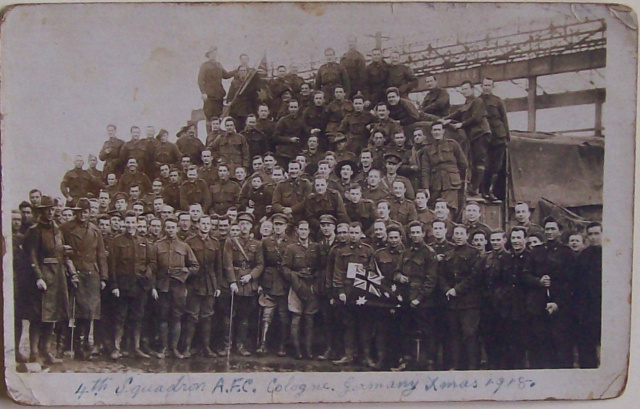
Christmas Day 1918, Digger centre row above Major Ellis with cane.
Photo courtesy Tovell family
The commotion caught the attention of the officers. Captain Jones – George Jones DFC, commanding B Flight to which Tovell belonged – called out, ‘Is anything the matter, Tim?’
Glad of someone else to take responsibility, Tovell waved away the beer, and led the boy by the hand to the top table. Ripples of laughter spread as they walked across the room.
‘Another new recruit, eh? Is that one of yours, Tim, come out of the woodwork? You told your missus yet?’ Tovell ignored them, and continued his stately escort: the elder soldier and this funny little kid, pathetic in his threadbare clothes, toes sticking through his shoes, but every bit as dignified in bearing.
‘Well, Tim, who have we got here?’ asked Captain Jones, as the band struck up again with tunes from The Merry Widow.
‘The boy pushed his way in, sir,’ replied the mess sergeant. ‘I thought he was just another little Hun and was going to boot him out. But he speaks good English. Says he’s French. One of the Allies.’
‘Is that so?’
The child’s face softened with a dimpled smile.
‘But certainly. I’ve been with the British Army throughout the war. First with the field artillery, then with the Royal Air Force. It’s with 48th Squadron that I came to Cologne.’
‘Don’t talk nonsense!’ Captain Jones didn’t like fibs. ‘Tell me the truth.’
‘Hang on a moment!’
Major Les Ellis, the Commanding Officer, interrupted. He was at the same table, looking quizzically at the boy. ‘I believe I’ve seen this little chap around No. 48’s hangars these past few days. You’re their squadron mascot, right?’
‘Yes, Majeur. But I’m with 48th Squadron no more. I’ve gone to the 43rd instead.’
‘Why?’
‘Because they’re more sympathetique.’
The boy spoke in an engaging way: one designed to flatter. The Flying Corps was then still part of the Australian Army. The officers all held army rank, and the lad quickly distinguished them.
‘A child? As a mascot with a fighting unit?’ Captain Jones was unconvinced. ‘How come?’ he asked, as the orphan turned towards him.
‘I have nobody, monsieur. My father and mother were both killed when the war began. So I’ve been told. I don’t remember them, though sometimes I think … But the brave Tommy soldiers saved me, and in return I became their mascot. I helped to bring them victory. Vive La France! God Save The King!’
The boy spoke with such passion, that the airmen found themselves surprisingly touched. The words seemed to stir their gentler emotions, suppressed by years of warfare, and they softly voiced assent. ‘Hear, hear! Good lad! Well spoken …’
‘And what do you want with us, young man?’
‘I’d like to share your Christmas dinner, Captain.’
‘Why not with your friends from 43rd Squadron? They’re celebrating Christmas. They told me after soccer this morning. Why come to us?’
The orphan’s attitude changed again. He had a variety of parts, each one of which he played in turn. It was the lesson of survival. So, now, he spread his hands, raised his eyes, and uttered a little French laugh.
‘Ho! It’s true the Tommies are having Christmas lunch. And what are they eating? Boiled mutton and cabbages! But you diggers are having a feast! It’s the talk of the aerodrome. Roast duck and apple sauce. Fruit and custard. I smelt it cooking and suddenly thought of maman … I come to you because the Aussie Christmas dinner is so much better than the Tommies!’
The boy’s frankness and charm was greeted with more laughter and banging of tables.
‘Too right, mate! He knows a good thing!’
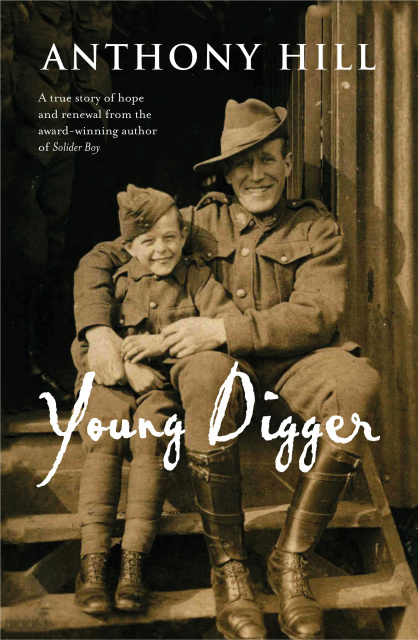 Captain Jones was disarmed and Tim Tovell allowed himself a smile. There was something endearing about the lad that reminded him of his own son, young Timmy, whom he’d last seen as a toddler in Queensland before going off to war, two years ago. Tovell squeezed the French boy’s hand.
Captain Jones was disarmed and Tim Tovell allowed himself a smile. There was something endearing about the lad that reminded him of his own son, young Timmy, whom he’d last seen as a toddler in Queensland before going off to war, two years ago. Tovell squeezed the French boy’s hand.
‘Perhaps we might let the little chap join us for Christmas,’ he said to Major Ellis.
‘That’s not for me to say,’ replied the CO. ‘This dinner has been paid for by the men themselves. We officers are here as your guests. It’s for the squadron to decide if the lad can join them.’
Tovell turned to the mess.
‘What do you say, boys? Can this young digger sit down?’
More applause and shouting.
‘Course Tim! Move up there. Find the kid a place.’
‘There’s your answer,’ said Les Ellis. ‘But Tim, keep an eye on the boy. See him safe back to the Tommies. You’re a father, and know about these things …’
‘Certainly, sir.’
Captain Ellis could not have chosen a better guardian for the war waif…
Books in print
Books still in print can be ordered through the website here
• The Burnt Stick ($16.95 plus $1.80 postage)
• For Love of Country ($35 plus $13.50 postage)
• The Story of Billy Young ($23 plus $8.50 postage)
•Soldier Boy($20 plus postage $2.10)
• Young Digger ($30 plus postage $8.50)
Complimentary bookmark, signature and personal inscription are included. I will refund any excess postage if multiple books are purchased.
The Autumn newsletter will come out in March.
Until then, with every good wish to you and yours for a very Happy Christmas and Joyful 2017
Anthony
http://www.anthonyhillbooks.com